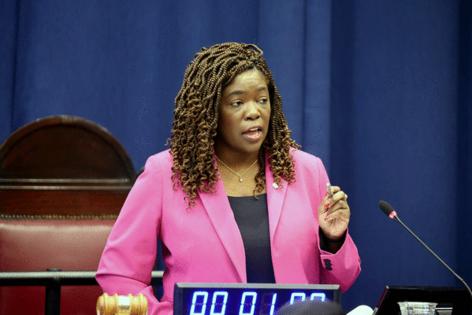Boston City Council passes ranked-choice voting system change for local elections
Published in News & Features
The Boston City Council passed a home rule petition that seeks to implement a ranked-choice voting system for city elections, that would see voters rank multiple candidates by order of preference rather than cast a single vote for their top choice.
The Council voted Wednesday to approve the petition, by an 8-4 margin, after a roughly hour-long debate over the merits of overhauling the city’s electoral system.
Mayor Michelle Wu plans to sign the home rule petition, her office said after the vote. The next step would be Beacon Hill. If approved by state lawmakers and signed by the governor, a switch to a ranked-choice voting system would also need to be OK’d by city voters, in a ballot referendum.
Ranked-choice voting, if it clears all those hurdles, would be implemented for mayoral and city council elections, by 2028 or 2029, at the earliest, according to Gabriela Coletta Zapata, who chaired hearings on the petition.
The measure was led by Council President Ruthzee Louijeune and co-sponsored by fellow progressive Democrat Councilors Julia Mejia and Henry Santana.
“This is an exciting day for the city of Boston, so it’s an exciting day for democracy and for what it looks like to bring people closer to democracy,” Louijeune said. “We know ranked-choice voting works and it’s straightforward.
“This is about making sure that we are building a better democracy by electing candidates who are able to build a broad majority of support, who are not just speaking to their base, who are not just speaking to extremists, but who are doing the work necessary to build broad coalitions, and to represent everyone in a district,” she added.
The measure was opposed by the Council’s three moderate Democrat councilors, John FitzGerald, Ed Flynn and Erin Murphy, along with Sharon Durkan.
Much of their argument centered around how complicated they thought the proposed voting system would be for residents, particularly for those who aren’t as well-versed in the English language.
“Adding ranked-choice voting would introduce unnecessary complexity to the process, confusing voters and potentially disenfranchising those already marginalized, particularly seniors and residents whose first language isn’t English, at a time when we should be working to make voting more accessible,” Murphy said.
Flynn also spoke of the confusion it would create at a time when the city’s Elections Department is under state receivership after its failures last fall.
“I don’t want to set us up for failure,” Flynn said. “That’s what we’re doing if we vote today to implement ranked-choice voting. Yes, there’s an election coming up. Yes, people want to support ranked-choice voting. It helps them politically.
“I understand that, but at some point we have to do what’s best for the residents of Boston, and to provide them with the positive leadership that they elected us to do. We know this system is going to fail,” he said.
Durkan also spoke of how “complicated” she thought ranked-choice voting would be, and said that even if the Council were to approve it, there’s not enough support at the State House for it to pass there.
“This has no future at the State House,” Durkan said, citing conversations she’s had with two state lawmakers who represent parts of her Beacon Hill and Back Bay-centric Council district.
Councilors who favor the change say that residents want ranked-choice voting.
A prior ballot question that would have implemented a statewide ranked-choice voting system was defeated by Massachusetts voters, by a 55% to 45% margin, in 2020. Louijeune and other proponents are banking on the 62% of Boston voters who supported that ballot measure as proof it could pass a citywide referendum.
If approved, ranked-choice voting would be in place for mayoral and district city council races in special and general elections when there are three or more candidates. Rather than voting only for their top choice, voters would rank up to four candidates, by order of preference.
If no candidate receives more than 50% of first-choice votes, the candidate with the fewest votes is eliminated and their votes are redistributed to the next-highest-ranked active candidate on each ballot. The process would then continue in rounds until one candidate earns a majority and is declared the winner, Coletta Zapata said in a committee report she read at the day’s meeting.
It would increase the number of candidates who advance from the preliminary to general elections for mayor and district city council, from two to four.
The proposed system would also be in place for the at-large council race, where the top four vote-getters in the city-wide council race are elected in today’s approach, for the general election, Coletta Zapata’s report states.
“For years, we have been working to implement ranked choice voting here in the city of Boston and move forward with a shift that is rooted in the belief that our election should reflect the full voices of our communities,” Mejia said. “It is a time marked by deep mistrust. Right now within our institutions, it has been now more than ever, more urgent to give voters a pathway to leadership that is representative, responsive and accountable.”
_________
©2025 MediaNews Group, Inc. Visit at bostonherald.com. Distributed by Tribune Content Agency, LLC.







Comments